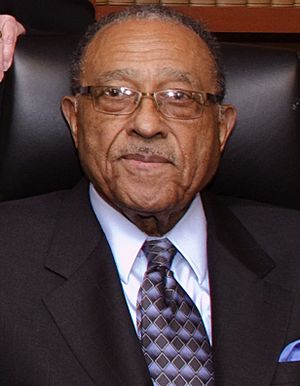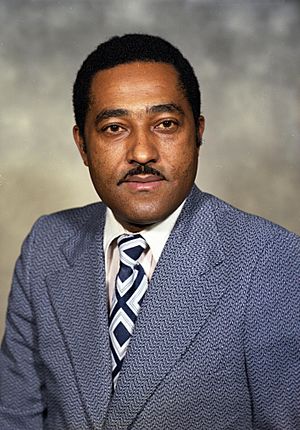Henry Frye facts for kids
Quick facts for kids
Henry Frye
|
|
|---|---|

Frye in 2015
|
|
| Chief Justice of the North Carolina Supreme Court | |
| In office September 2, 1999 – January 1, 2001 |
|
| Appointed by | Jim Hunt |
| Preceded by | Burley Mitchell |
| Succeeded by | I. Beverly Lake Jr. |
| Associate Justice of the North Carolina Supreme Court | |
| In office January 13, 1983 – September 2, 1999 |
|
| Appointed by | Jim Hunt |
| Preceded by | John Phillips Carlton |
| Succeeded by | Franklin Freeman |
| Member of the North Carolina Senate from the 19th District |
|
| In office January 1, 1981 – January 1, 1983 |
|
| Preceded by | James Turner |
| Succeeded by | Elton Edwards |
| Member of the North Carolina House of Representatives | |
| In office January 1, 1969 – January 1, 1981 |
|
| Preceded by | Skipper Bowles James G. Exum Elton Edwards Daniel Whitley Jr. |
| Succeeded by | Dorothy Rockwell Burnley |
| Constituency | 26th District (1969–1973) 23rd District (1973–1981) |
| Personal details | |
| Born | August 1, 1932 Richmond County, North Carolina, U.S. |
| Spouse | Shirley Taylor |
| Alma mater | North Carolina A&T State University University of North Carolina School of Law |
| Occupation | lawyer |
| Military service | |
| Allegiance | |
| Branch/service | |
| Rank | Captain |
Henry E. Frye (born August 1, 1932) is an American judge and politician. He made history as the first African-American chief justice of the North Carolina Supreme Court.
Contents
Early Life and Education
Henry Frye was born on August 1, 1932, in Ellerbe, North Carolina. He was one of 12 children. His parents, Walter Atlas and Pearl Motley Frye, were tobacco and cotton farmers. Henry went to the Ellerbe Colored High School.
After high school, he graduated with honors from North Carolina A&T State University. He then joined the United States Air Force and became a captain. He served in Korea and Japan.
When he returned to North Carolina, Henry wanted to become a lawyer. This was after he was stopped from registering to vote because of unfair literacy tests. He was the only African American student in his law school. He graduated from the University of North Carolina School of Law.
Henry Frye's Career in Law and Politics
In 1963, Henry Frye became an assistant U.S. Attorney. He was one of the first African Americans to hold such a job in the Southern United States.
Five years later, in 1968, Frye was elected to the North Carolina General Assembly. He became a state representative. He was the only Black legislator in North Carolina at that time. He was also the first one elected in the 20th century. He started his work in the North Carolina House of Representatives on January 15, 1969.
Frye helped to remove the last parts of Jim Crow laws from North Carolina law. These laws had enforced racial segregation. He was re-elected many times to the state House. He served there until 1980. Then, he served one term in the state Senate from 1981 to 1982. During this time, he also taught at North Carolina Central University's law school.
In 1983, Governor Jim Hunt chose Frye to be an associate justice on the North Carolina Supreme Court. This made him the first African American to hold that position in North Carolina's history. When asked about his hopes for North Carolina, Frye said he wanted the state to be truly fair and open to everyone.
He was elected to the court in 1984 and again in 1992. In 1999, Governor Jim Hunt appointed Frye to the highest judicial job in the state: chief justice. He replaced Burley Mitchell. However, in 2000, he lost the election for a full term to Associate Justice I. Beverly Lake Jr..
People who worked with Frye said he was very careful and curious. When he started new political and judicial roles, he would study state laws and court documents very closely. He was known for asking many thoughtful questions. He also loved poetry and often used poems in his speeches.
In 2001, Frye started working in private law practice. He joined the firm Brooks, Pierce, McLendon, Humphrey & Leonard in Greensboro, North Carolina. He focused on helping people solve problems through mediation and arbitration. He also worked on cases that went to higher courts. He retired from this firm in 2016.
Awards and Honors
Henry Frye has received many awards for his important work.
- In 2006, he and his wife, Shirley, received the Justice Award from the American Judicature Society. This is their highest honor. They got it for their great work to make American justice better.
- In 2007, Frye received the North Carolina Award for public service. He also got the John J. Parker Award, which is the highest award from the North Carolina Bar Association.
- In 2009, he became an honorary co-chairman for Kenneth Lewis's U.S. Senate campaign.
- In 2013, he was named chairman of the North Carolina Institute of Political Leadership.
- In 2014, the General Alumni Association gave Frye the Distinguished Service Medal.
- In 2015, a portrait of him was placed in the North Carolina Supreme Court. Governor Jim Hunt and other important judges spoke at the ceremony. Frye talked about how much progress the state had made. He also said that change happens when people work together.
- In 2016, the North Carolina Bar Association gave him an award called the Legal Legends of Color Award.
- In 2017, he was invited to speak at the University of North Carolina School of Law's Constitution Day event.
- In 2018, a bridge was named in his honor.
- He has also received special honorary doctorates from several universities. These include Shaw University, Livingstone College, Fayetteville State University, and North Carolina A&T State University.
Family Life
Henry Frye is married to Shirley Frye. Shirley is also a well-known person who works for civil rights and social justice. She has won awards for her public service in news, government, and education. In the 1970s, she helped to bring together the two separate YWCAs in Greensboro.
One of their children, Henry Frye Jr., also became a lawyer and a judge. Henry Frye is also the granduncle of professional basketball player Channing Frye.
See also


